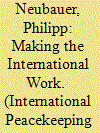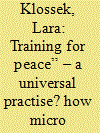|
|
|
Sort Order |
|
|
|
Items / Page
|
|
|
|
|
|
|
| Srl | Item |
| 1 |
ID:
185891


|
|
|
|
|
| Summary/Abstract |
Over the years, the police have become a central component of international peace- and statebuilding operations. However, predominantly trained and socialized as members of a domestic police service, police officers enter the global arena only – if ever – temporarily: their international deployment is often merely an interlude to their regular domestic police service. Pre-deployment training for international missions is therefore deemed vital for their success. When abroad, officers oftentimes find themselves carrying out work that has little resemblance to everyday police work back at home. By conceptualizing police training experts as “brokers”, the article helps to uncover the practices these brokers deploy to bridge the boundary between domestic policing and international missions. The research for this article was informed by practice theoretical considerations and ethnographically informed research strategies. It reveals that in several European countries, trainers’ brokerage is primarily practiced as a passing on of recent personal experience, by the creation of artificial borderlands that are meant to mimic the reality on the ground, and by diluting the boundary temporarily.
|
|
|
|
|
|
|
|
|
|
|
|
|
|
|
|
| 2 |
ID:
170280


|
|
|
|
|
| Summary/Abstract |
Applying a Bourdieusian feminist practice theory approach to the study of norm implementation, this article introduces a fourth level of analysis, the embodied subject who is expected to be governed by peacekeeping norms. It does so by examining the training experiences of Rwandan tactical-level female military peacekeepers deployed in mix-gender contingents to UNAMID. It is argued that the pre-deployment training space is a field of norm contestation and negotiation, wherein gendered peacekeeper subject positions and gendered peacekeeping labouring practices are constructed and performed. The research findings suggest that by partially complying with the UN’s gender mainstreaming norms, the Rwanda Defence Force strengthens the military’s gender protection norms and establishes the sexual division of labour of the mission area. Trained to perform a scripted Rwandan female subject position, some women find they are not adequately prepared for the more challenging situations they find themselves in when working in multi-dimensional peacekeeping operations and devise alternative, informal training practices to better equip themselves prior to deployment. The case study draws on 65 depth-interviews with Rwandan military personnel, trainers and external consultants and non-participatory observations of field exercises.
|
|
|
|
|
|
|
|
|
|
|
|
|
|
|
|
| 3 |
ID:
175459


|
|
|
|
|
| Summary/Abstract |
Why have the EU and India been unable to explore the common potential of their partnership in peacekeeping training? Drawing upon the literature of practice theories and the concept of community of practices, as well as semi-structured interviews with policy-makers and peacekeeping trainers from India and the EU, policy documents and participant observation, the article explores the complementarity of structures of the EU’s and India’s training communities and discusses the implicit knowledge which is guiding the practices of actors. Thereby, the article moves away from offering structural explanations, such as diverging strategic interests, which have dominated the literature on the EU’s external relations with Asia. Comparing the practice communities, the article finds substantial divergence in the material and ideational structure of training institutes. Moreover, the article illustrates that the disposition of actors in the Indian training community is characterised by the unspoken understanding that India’s training philosophy is more compatible with other countries from the Global South. While both structures, as well as dispositions of actors are unfavourable vis-à-vis an EU–India partnership in peacekeeping training, the article concludes that by addressing familiarity gaps among training communities, divergences in structures and dispositions can be overcome.
|
|
|
|
|
|
|
|
|
|
|
|
|
|
|
|
|
|
|
|
|